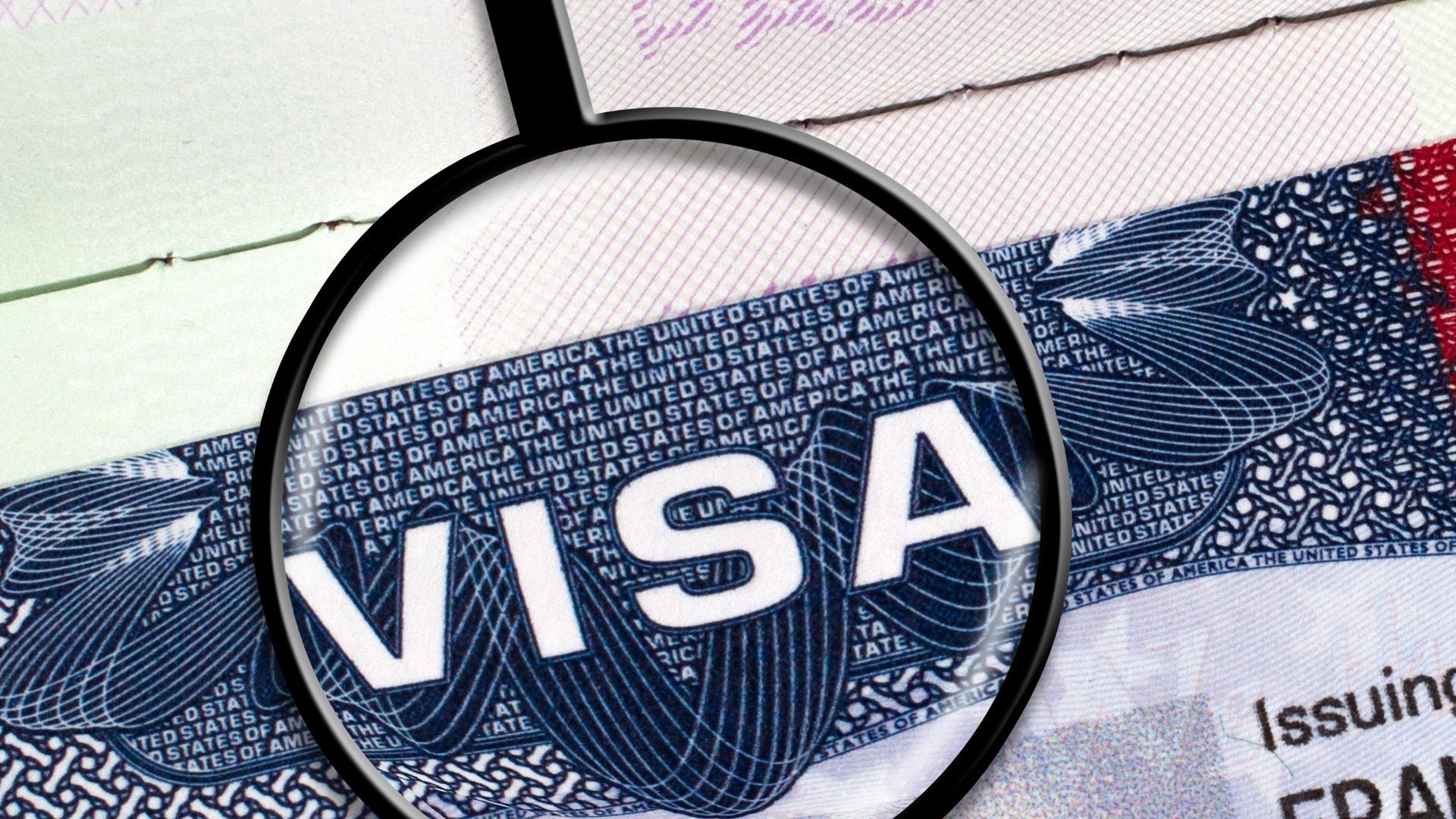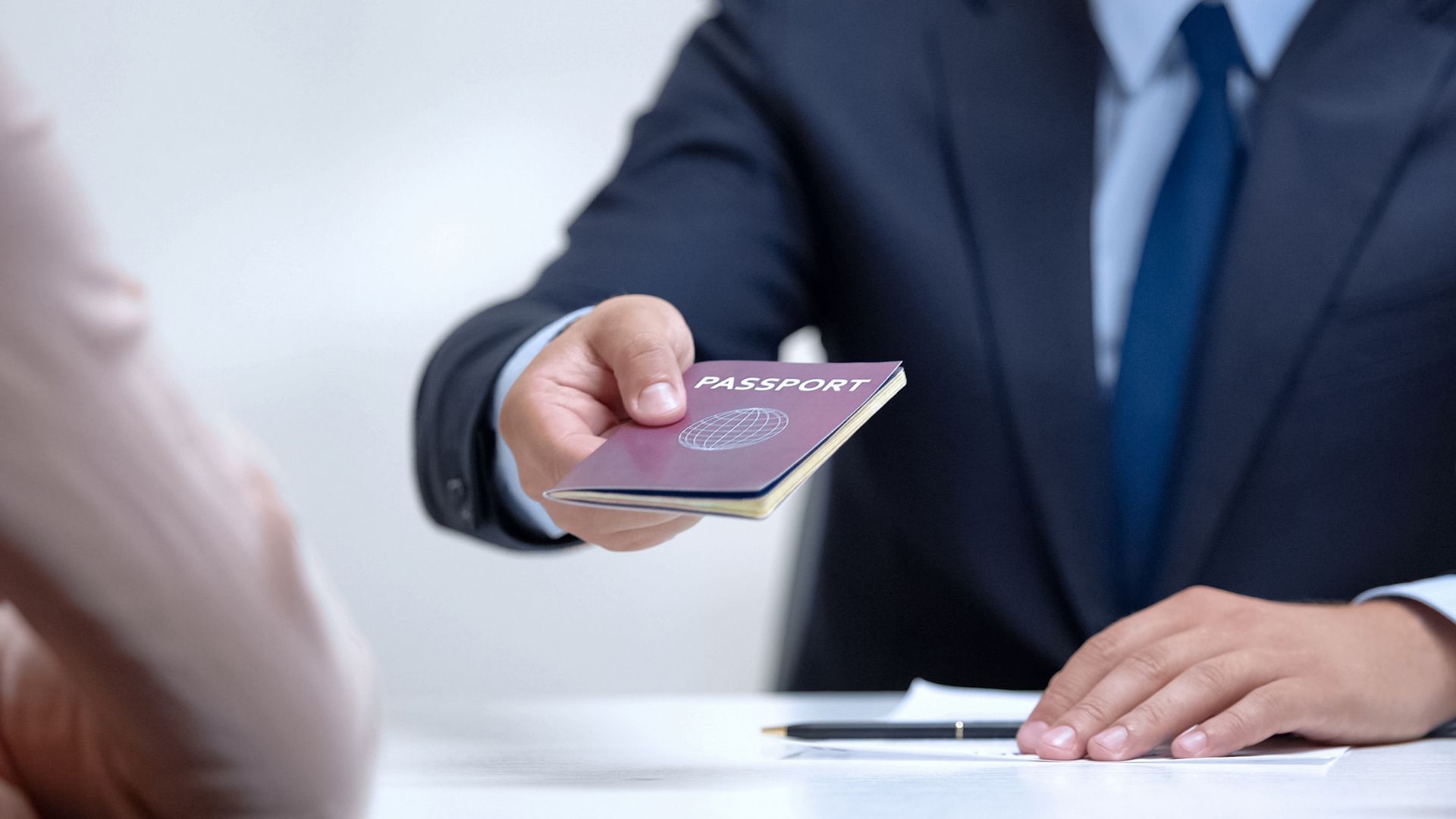Blog Layout
Irina Brown • Jan 12, 2024
Legal Clinic
Do you need FREE legal help?
We are excited to host our first no-cost legal clinic four your community. Please contact us or click on the link below to sign up for a FREE legal consultation.
Attorneys: Burke Brown III & Zechen Feng
Where: Columbus Chamber of Commerce
When: Tuesday, January 30th 9:30 am - 6:00 pm
Practice areas include:
Immigration
Estate Planning
Small Business
Adoptions
Guardianships
Sign up Link:

By Irina Brown
•
14 Dec, 2023
Among the intricate labyrinth to secure a U.S. visa, the enigmatic "visa number" may stand out to an applicant. So, unraveling this seemingly cryptic identifier's significance is key to understanding the broader functions and implications of holding a U.S. visa. It surpasses being a mere endorsement on a passport; it symbolizes access to a world of opportunities — reunions with loved ones, pursuit of education, or engagement in professional pursuits. For many, a U.S. visa signifies the threshold to a brighter future, promising new beginnings and diverse experiences. 1. Decoding the Visa Number The visa number isn’t just a random sequence of characters; it's a distinct marker designated to each visa. Contrary to its name, it isn't a simple count of visas issued in a year. Rather, it’s an alphanumeric code on each visa ’s stamp that’s essential for both immigration authorities and visa holders. This identifier facilitates tracking by referencing specific visas, playing a vital role in administrative processes and official use. 2. Legal Documentation and Compliance Possessing a U.S. visa transcends the mere act of gaining entry — therefore, it requires adherence to the United States' immigration laws. Each successful applicant is a testament to their eligibility to enter the country for specified purposes, whether for work, study, family reunification, or other authorized activities. So, understanding a visa’s intricacies, constraints, and legal obligations is pivotal to ensuring compliance with U.S. immigration regulations. 3. A Lifeline in Complexity The labyrinth of the U.S. immigration system can be daunting. However, the visa number serves as a guiding light, aiding in monitoring application statuses, validating details, and accessing pertinent information. It acts as a reference point in a multifaceted system, helping applicants and authorities efficiently manage the visa process. 4. Sustaining Connections and Contributions Beyond its immediate purpose of entry, a U.S. visa fosters enduring connections and contributions. It allows individuals to weave themselves into the fabric of American society, fostering cultural exchanges, knowledge sharing, and economic contributions. Immigrants, through their diverse perspectives and skills, enrich the social tapestry and contribute significantly to the nation's growth and innovation. The visa number, therefore, isn't just a marker for entry; it's a catalyst for ongoing integration and contribution within the United States. 5. Protection and Recourse Finally, the visa number is critical to safeguard a visa holder’s rights . It provides a reference point for accessing legal recourses and protection in case of disputes or issues that arise during their stay in the United States. Understanding the significance of this number empowers individuals to navigate legal frameworks effectively. This ensures they are aware of their rights and avenues for seeking assistance before removal . Ultimately, it acts as a shield, offering reassurance and avenues for support within a foreign legal landscape. What is the Visa Number on a US Visa Behind the enigmatic visa number lies a world of significance and opportunity. It symbolizes far more than just a numerical sequence; it represents dreams, aspirations, and the legal pathway to access the United States. Understanding its importance is integral for those navigating the intricate process of entering the country. Whether reuniting with family, pursuing education, or advancing careers, a U.S. visa is the key that unlocks numerous possibilities for individuals around the globe. At Polaris Lawyers, we understand that behind every visa number lies a unique story and a world of aspirations. Our dedicated team is committed to guiding you through the complexities of US immigration, ensuring that your journey is navigated with precision and care. Contact us today to decode the visa process and transform your aspirations into reality within the United States.

By Irina Brown
•
28 Nov, 2023
Navigating the United States’ immigration process is a complex journey, especially with petitions like Form I-751. For those seeking to remove the conditions on their residence, understanding this form’s timeline is crucial. Form I-751, used to remove conditions on a conditional green card obtained through marriage, has a specific timeline and steps that applicants need to be aware of. Understanding Form I-751 Form I-751 is critical for anybody who obtains a green card by marrying a U.S. citizen or permanent resident. This form is used to request the removal of conditions on their residency, typically within the 90-day period before their conditional green card expires. However, understanding this process’s nuances is vital, as filing delays or errors can impact the entire timeline. Timelines and Processing Once Form I-751 is submitted, the processing timeline can vary. On average, USCIS aims to process these petitions within 12 to 18 months (about 1 and a half years). However, this timeline isn't fixed and can be affected by various unforeseen factors. Some common ones include your USCIS service center ’s caseload, the submission’s completeness, and any additional documentation requested. Biometrics Appointment and Interviews After submitting the form, applicants may be required to attend a biometrics appointment where fingerprints and photos are taken. Sometimes, USCIS may schedule an interview to further evaluate the marriage’s legitimacy. These appointments’ scheduling influences the overall timeline, sometimes adding several months to the process. Potential Delays and Strategies Numerous factors can lead to delays in Form I-751's processing, such as missing documents, insufficient evidence of a bona fide marriage , or issues with the application itself. However, applicants can proactively reduce the risk of delays by ensuring a meticulously prepared submission, responding promptly to USCIS requests, and seeking legal guidance if needed. Conditional Permanent Resident Extension In cases where Form I-751's processing extends beyond the conditional green card's expiration, USCIS provides a one-year extension letter. This letter serves as proof of continued lawful status while the petition is pending. However, it's crucial to keep this letter safe and maintain it along with the expired green card to avoid any complications regarding legal status during this period. Keeping these documents safe can alleviate many concerns and provide peace of mind during the processing period. Receiving the 10-Year Green Card Once USCIS approves Form I-751 and removes the conditions on the residency, the applicant receives a 10-year green card. This card signifies permanent residency without conditions and offers more flexibility and security. Understanding the transition from a conditional to a permanent green card is vital, as it opens opportunities for travel, work, and residency without the need for further petitioning. Appeal and Further Action In the event of a denial, applicants have the right to appeal the decision. Understanding the reasons for denial, gathering additional evidence, and presenting a strong case is especially crucial. Seeking proper legal guidance is essential to navigate the complexities and potentially rectify any issues that led to the denial. Being aware of these options and the subsequent steps after a denial empowers applicants to take informed action to safeguard their immigration status. We'll Help you Navigate the Form I-751 Timeline Navigating the Form I-751 timeline demands attention to detail and patience. Understanding the process, proactively gathering all documents, and promptly responding to USCIS requests can significantly impact the overall timeline. However, the unpredictable processing times and delays underscore the importance of seeking legal counsel to navigate this at this crucial step. Remember, while Form I-751's timeline can be uncertain, staying informed and prepared can help ease the journey toward permanent residency in the United States. If you’re looking for an experienced team that’s focused on immigration law and your rights, get in touch with us. Polaris Law Group’s excellent track record and dedication will go a long way in helping you maintain your status and stay in our wonderful nation.

By Irina Brown
•
17 Oct, 2023
Deportation and removal proceedings can be daunting, life-altering experiences for many immigrants. Unsurprisingly, facing separation from your loved ones and being sent to a country that isn't home is incredibly stressful. So, we’ll explore the importance of deportation and removal defense and how our experienced immigration team helps you navigate these challenging situations. 1. Understanding Deportation and Removal Proceedings Deportation and removal proceedings are legal processes by which the U.S. government can remove prospective immigrants who have seemingly violated immigration laws. These violations chiefly include overstaying a visa , criminal convictions, or fraudulent actions. However, no matter your immigration status, you possess many rights during these proceedings. These include the rights to legal representation and to challenge your deportation order. Navigating deportation and removal proceedings without proper legal guidance can be extremely challenging and concurrently carries severe consequences. This is where experienced immigration lawyers come in. They play a vital role in building a strong defense strategy tailored to your specific circumstances. They can help you explore legal remedies like asylum, cancellation of removal, and waivers, to fight and avoid deportation. 2. Asylum and Protection from Persecution One common avenue for deportation defense is seeking asylum. Asylum can protect anybody who credibly fears persecution in their home country due to their race, religion, nationality, political opinion, or membership in a particular social group. Skilled immigration attorneys can help you gather evidence, prepare your case, and guide you through the complex asylum application process . 3. Cancellation of Removal and Other Options Cancellation of removal is another strategy that’s available to lawful permanent residents and non-permanent residents facing deportation. It requires demonstrating strong ties to the U.S., a history of evidently good moral character, and showing that your removal would result in unusual hardship to qualifying relatives. Expert immigration lawyers can assess your eligibility for cancellation of removal and secure your status in the United States. 4. Building a Strong Defense Strategy Building a strong defense strategy is the cornerstone of effective deportation and removal defense. For example, immigration lawyers at Polaris Law Firm understand that every case is unique, and cookie-cutter approaches simply won't suffice. They work diligently to craft a compelling defense by analyzing your legal hurdles, identifying weaknesses, and leveraging your strengths. Whether they’re gathering evidence, preparing witnesses, or challenging legal arguments, a well-planned defense team can make all the difference. 5. Navigating the Appeals Process When facing deportation or removal proceedings, the fight doesn't necessarily end with the initial decision. In many cases, defendants have the option to appeal an adverse decision and should consider this in their legal strategy. Unsurprisingly, experienced immigration attorneys are well-versed in the appeals process and can guide you through each step. They can help you identify grounds for appeal, gather additional evidence, and craft persuasive legal arguments to present before the appellate authorities. Navigating the appeals process can be complex, but with the right legal representation, you can continue to pursue relief and protect your right to stay in the United States. 6. Keeping Families Together Finally, the most heart-wrenching aspect of deportation or removal is the potential breakup of a family. Immigration lawyers understand the significance of maintaining familial unity and can explore various legal options to prevent the deportation of one or more family members. This may involve filing petitions for family-based immigration benefits, pursuing waivers, or seeking humanitarian relief . By prioritizing a family’s reunification and future, our attorneys can correspondingly minimize the emotional and practical hardships of deportation. We know that it's not just about cases and verdicts; it's about preserving the bonds that tie families together in pursuit of the American dream. Arrange Your Deportation and Removal Defense We understand that deportation and removal defense are deeply personal, and the outcomes will reshape your life. It's crucial to recognize your rights and to have the support of experienced legal professionals to successfully navigate this challenging terrain. Your future in the United States matters to us, and we're here to protect your rights and fight for your place in this country that you call home. At Polaris Lawyers, we don't just see cases; we see individuals with unique stories and dreams. Our dedicated team is committed to building a strong defense strategy that's tailored to your unquestionably distinct circumstances and aspirations. Reach out to us today to schedule a consultation and take that important first step toward securing your immigration status.

By Irina Brown
•
08 Sep, 2023
Car accidents are a harsh reality that can affect anyone, anytime, anywhere. In some instances, these accidents result in minor dings, while others lead to grave injuries and even fatalities. When the aftermath of a car accident leaves you grappling with uncertainty, this article is here to guide you through the essential steps to take and illuminate the scenarios where criminal defense might become a necessity. 1. Gather Evidence In the immediate aftermath of a car accident, an invaluable window of opportunity opens – the chance to gather evidence. Assuming you're physically able, seize this moment to document the scene comprehensively. Take photographs of the involved vehicles that capture the damage, the road conditions, and traffic signs or signals. Moreover, it's crucial to exchange information with the other driver(s), ensuring you gather names, contact details, insurance information, and vehicle registration numbers. These seemingly routine details can transform into potent evidence should a legal dispute arise. 2. Seek Medical Attention A priority that can't be overstated is your health and well-being. Even if you emerge seemingly unscathed immediately after the accident, seek medical attention. This is because internal injuries like whiplash might not show symptoms until much later , perhaps even days after the incident. A medical evaluation not only guarantees your welfare but also constructs an official record of your injuries – a record that could play a pivotal role in potential legal claims. 3. Coordinate with your Insurers Following a car accident, you'll inevitably cross paths with insurance companies as you report the incident and initiate a claim. While insurance exists to provide financial assistance, it's crucial to remember that these companies are businesses driven by their own interests. It's not uncommon for them to attempt to shift liability or minimize claim values. Engaging an experienced criminal defense attorney in conversations with insurance adjusters ensures your rights stay shielded and that reasonable compensation remains within your grasp. 4. Consider Hiring an Attorney While many accidents are minor incidents, certain circumstances can pave the way for criminal defense to take center stage. If you find yourself staring at criminal charges like reckless driving, DUI, hit and run, or even vehicular manslaughter, you need proper legal representation. In such critical junctures, a skilled criminal defense lawyer can weave together a robust defense strategy. They meticulously investigate the accident's circumstances, amass evidence, and stand as your staunch advocate in the courtroom. 5. Build a Strong Legal Defense When criminal charges stem from a car accident, erecting a formidable legal defense is imperative. A seasoned criminal defense attorney can meticulously dissect evidence, question witnesses, and meticulously examine the prosecution's case for any potential legal fissures. This professional scrutiny uncovers truths and consequently ensures that the scales of justice stay balanced. Your choice of attorney can carve the path to reduced charges, amenable plea bargains, or even dismiss charges. With an unwavering commitment to your cause, they'll collaborate closely with you, decoding the accident's nuances, potentially summoning expert opinions, and crafting a tailored defense that fits your unique narrative. Navigating criminal cases requires seasoned experts who comprehend its intricacies. By enlisting an adept criminal defense attorney , you gain an impregnable defense – one that safeguards your rights, shores up your reputation, and lays down the path to your future. We can Guide You After a Car Accident Car accidents, unwelcome as they are, can evolve into legal maelstroms. When the dust settles, an unwavering legal defense emerges as a guiding light. While not every accident results in a criminal defense case, recognizing these scenarios can guide your actions and shield your rights. Remember to meet with a dedicated legal advisor and use your Fifth Amendment right to stay silent when needed. Each member of our comprehensive team is proud to represent you, our community. Reach out today to schedule a consultation so we can look at your case and get to know you. We look forward to walking alongside you inside and outside of the courtroom as we protect your rights and future.

By Irina Brown
•
28 Aug, 2023
Adoption is a beautiful and life-changing process that brings families together and gives children a loving and supportive home. If you are considering adoption in the state of Nebraska, it's important to understand the legal aspects and involved requirements. Navigating Nebraska’s adoption process can feel overwhelming, but with the right knowledge and guidance, you can successfully navigate this journey. In this blog post, we will explore the main points to help you understand the Nebraska adoption process and the role of a great lawyer in assisting you throughout this transformative experience. Understanding the Costs and Financial Assistance While adoption is a rewarding experience, it's essential to be aware of the associated costs. The expenses involved in the Nebraska adoption process can vary depending on the type of adoption, agency fees, legal fees, and other factors. Under limited circumstances, financial assistance, such as adoption grants, subsidies, and tax credits may be available. Great adoption lawyers can help you navigate the financial aspect of the adoption process, ensuring that you make informed decisions for your growing family. It is important to understand the legal fees associated with adoptions. A flat-fee arrangement will allow you to know all costs at the time of signing, whereas an hourly fee retainer will result in variable costs. Navigating Nebraska’s Types of Adoption Nebraska permits several types of adoption , and it's crucial to understand each option before proceeding. The most common ones include international, private, foster care (agency), stepparent, and relative adoptions. Agency adoptions involve working with licensed adoption agencies that facilitate the process, while private adoptions typically involve direct arrangements between birth parents and adoptive parents. Conversely, stepparent adoptions occur when a new spouse adopts their partner's child, and relative adoptions involve adopting a child within the family, such as a grandchild, niece, or nephew. However, international adoptions involve additional coordination with local and federal agencies in the United States and the child’s respective home country. With this additional coordination, working with a reputable adoption attorney who fully understands international and immigration law is quite imperative. Meeting the Adoption Requirements To adopt a child in Nebraska, prospective adoptive parents must meet certain requirements set forth by state law. These requirements typically include being at least 19 years old, having a stable and suitable home environment, passing a criminal background check, and completing a home study. The home study is a comprehensive assessment of the adoptive family's readiness to provide a safe and nurturing environment for a child. It involves interviews, home visits, and background checks conducted by a licensed adoption agency or social worker. Any home study is generally a large financial hurdle that can be waived under certain circumstances. Polaris Law Group can guide you through the home study process and ensure that you meet all the requirements. Working with Lawyers for Legal Support Adoption is a legal process that involves complex paperwork, court hearings, and compliance with state laws and regulations. Their experienced attorneys understand the intricacies of Nebraska's adoption process and can assist you with any legal documents, court proceedings, and consultations. Once you have completed the necessary steps, including the home study, obtaining a visa, and the placement of the child, finalization of the adoption takes place. This involves attending a court hearing where the judge reviews the case and issues the final decree of adoption. After the adoption is finalized, you can move forward as a legally recognized family. However, the adoption journey doesn't end there. Polaris Lawyers can also assist you with post-adoption matters, such as obtaining amended birth certificates, navigating open adoption agreements, and addressing any legal issues that may arise in the future. Consult with an Experienced Adoption Lawyer Adopting a child is a significant decision that can transform your life and the life of a child. Understanding the Nebraska adoption process is essential for a smooth and successful journey. Whether you choose agency adoption, private adoption, stepparent adoption, or relative adoption, having the guidance and support of experienced professionals can make all the difference. From navigating the legal requirements to finalizing the adoption, Polaris Law Group will stand by your side in adoption , immigration , and criminal defense cases. Contact us today to ensure that you have the legal assistance you need every step of the way. With our help, you can confidently navigate the Nebraska adoption process and embrace the joy of creating your forever family.

By Irina Brown
•
13 Jul, 2023
Plea bargaining is a common practice in the legal system that allows defendants to negotiate with prosecutors and potentially receive reduced charges or sentencing in exchange for pleading guilty. However, like any legal strategy, there are pros and cons associated with plea bargaining. It is a crucial tool to expedite the judicial process and manage the overwhelming caseloads faced by courts. Pros and Cons of Plea Bargaining's Effects As with any legal strategy, understanding the pros and cons of plea bargaining is essential for defendants to protect their rights and secure the best possible outcome. In this article, we'll examine the pros and cons of plea bargaining, shedding light on its complexities and implications for defendants. 1. Expedited Resolution One of the primary benefits of plea bargaining is its ability to expedite the resolution of cases. Our nation’s court systems are burdened with a backlog of cases, leading to delayed trials and lengthy wait times. Reaching a plea agreement helps both prosecutors and defendants avoid lengthy trials, reducing strain on the courts. This consequently allows the legal system to allocate its resources more efficiently and focus on cases that actually require a trial. 2. Reduced Sentencing Another advantage of plea bargaining is the opportunity for defendants to secure reduced charges or sentencing. Prosecutors may negotiate plea deals to avoid trial uncertainty or obtain defendant cooperation in other investigations. By accepting a plea bargain, defendants can potentially avoid the risk of harsher penalties if convicted at trial. This can be particularly appealing in cases where evidence is strong or potential consequences are severe. 3. Certainty and Control Plea bargaining offers defendants a certain level of control over their fate. By negotiating a plea deal, defendants can actively participate in the decision-making process and potentially achieve a more predictable outcome. Going to trial can be unpredictable, with various factors, such as jury biases or unexpected evidence, influencing the final verdict. Conversely, plea bargaining empowers defendants to understand potential consequences and make informed decisions. 4. Potential Coercion or Intimidation While plea bargaining has its advantages, there are significant concerns associated with this practice. One of the main criticisms is the potential for coercion and injustice. Defendants, even if innocent, might feel pressured to accept plea deals due to overwhelming evidence or severe charges. The fear of maximum penalties or uncertain trial outcomes can lead defendants to agree against their better judgment. This consequently raises ethical questions about the fairness of the process and the potential for innocent individuals to plead guilty. 5. Lack of Transparency An additional aspect to consider when examining the pros and cons of plea bargaining is its potential impact on judicial transparency. Plea agreements are often negotiated privately, without public scrutiny or opportunity for victim or family input. This lack of transparency can raise questions about the fairness and accountability of the justice system. The legal system needs to strike a balance between efficiency and transparency . While plea bargaining manages caseloads, it's crucial to maintain accountability and public confidence in the administration of justice. Courts and legal professionals must continually evaluate and improve the transparency of plea bargaining, taking steps to enhance the understanding and trust of all stakeholders involved. Contact Nebraska’s Dedicated Legal Partners Plea bargaining is a complex and controversial practice within the legal system. While it expedites case resolution and potentially reduced charges or sentencing, plea bargains also raise concerns about coercion and potential injustices. It is crucial for defendants to carefully evaluate their options, seeking advice from experienced legal professionals who can help them navigate plea bargains and make informed decisions. We’re privileged to help our community navigate the criminal justice system and find the best outcome for their case. Contact us today if you’re looking for tailored representation and legal advice. We look forward to meeting with you and providing the legal aid you deserve .

By Irina Brown
•
29 Jun, 2023
Knowing when to apply for asylum is crucial to protecting anybody seeking refuge in the United States after facing persecution in their home country. The United States has a well-established asylum system that is based on federal and international human rights law. Changing standards and executive priorities create hidden traps and pitfalls that require diligent work to uncover. Navigating the asylum system can be daunting and confusing, especially for those unfamiliar with immigration law. Therefore, we'll provide a comprehensive guide on applying for asylum in the United States, including criteria, processes, and supporting evidence. When You Should Apply for Asylum Anybody who decides to apply for asylum in the United States must meet certain criteria. First, you must prove that you fit the criteria of being a refugee, someone who has fled their country and cannot return due to a well-founded fear of severe persecution. Secondly, the persecution must be on ac count of their race, religion, nationality, political opinion, or membership in a particular social group. And finally, their government must be the persecutor, or they must show that their government is unable or unwilling to protect them from the persecutor. To support your asylum claim, it's crucial to provide evidence that shows that you suffered past persecution or have a well-founded fear of persecution in your home country. This can include personal testimony, photos, documents, expert affidavits, and country condition reports. The more compelling and comprehensive your evidence is, the stronger your case will be. It's important to be truthful and transparent as inconsistencies can hurt your case. Due to the dire circumstances most asylum seekers face in their home countries, there is a built-in appeal process if an asylum petition is wrongfully denied. Initiating the Asylum Application Process There are two common ways to apply for asylum in the United States, affirmative and defensive. Both ways require careful attention to detail and thorough preparation. It’s imperative that you gather and submit all relevant supporting evidence, such as affidavits, medical records, or news articles immediately. By doing this, you will show that you have a credible fear of persecution in your home country. We've found that supporting evidence plays a crucial role in strengthening your case and increasing the chances of a successful asylum application. Make sure your evidence is well organized and relevant to the persecution you suffered in your home country. To increase the likelihood of a successful application, we’d recommend reaching out to a client-focused immigration lawyer to help bolster your application. 1. Affirmative Asylum Affirmative asylum is for those asylum seekers who aren’t in removal proceedings. If you’re eligible for affirmative asylum, you must file Form I-589 with the United States Citizenship and Immigration Services (USCIS) within one year of your arrival, unless an exception applies. This form serves as your application for asylum and requires detailed information about your background, reasons for seeking asylum, and any supporting evidence you have. If you have been in the United States longer than one year, you should consult with a trusted immigration lawyer to see if one of the exceptions to the one-year rule apply. 2. Defensive Asylum Defensive asylum, on the other hand, is for individuals already in removal proceedings. If you find yourself in this situation, you can request asylum as a defense against removal. Additionally, certain applications are selected for expedited processes, such as when an applicant is facing deportation. The steps involved in the defensive asylum process are like affirmative asylum, including filing Form I-589 and submitting supporting documentation. However, you’ll present your case before an immigration judge during your removal proceedings instead of with USCIS. We Specialize in Asylum Applications Applying for asylum in the United States can be a difficult and daunting process but is not impossible. It is important to seek legal guidance and assistance throughout the asylum application process. We encourage you to be informed, prepared, and persistent when applying for asylum in the United States. With the correct guidance and support, you may be able to find safety and security in our great nation. If you're in need of legal aid regarding your asylum case, our dedicated team is readily available to help. Contact us today to arrange a legal consultation and embark on the path toward a favorable resolution. You can count on our tailored guidance to identify the optimal approach to achieve your desired outcome.

By Irina Brown
•
24 May, 2023
A great legal consultation is imperative for anybody dealing with a lawsuit, civil suit, or other legal proceeding. Unfortunately, reaching out for legal advice can be intimidating and unclear to anybody unfamiliar with our nation’s legal processes. That's why you should look for a reputable lawyer who provides personalized legal advice to help their clients make informed decisions. Therefore, we'll discuss what a potential client should look for in a legal consultation at any law firm. A Professional and Knowledgeable Team Legal issues can be stressful and sensitive for anybody involved in a potential or ongoing legal case. That's why you should look for a comfortable and confidential environment at any prospective law office. You must feel empowered, confident, and at ease when discussing your case with any lawyer. Each consultation with your lawyer is strictly confidential in accordance with attorney-client privileges . This allows any client to share the details of their case without fearing any judgment or repercussions. You’ll meet with a professional and knowledgeable team that supports you, listens to your concerns, and addresses any questions . Additionally, they’ll research and stay up to date with changes in laws and regulations that may impact your case. Lastly, legal terminology and procedures can be complex and confusing. The best attorneys provide clear, concise, and easy-to-understand answers to ensure that you're fully informed about your situation. However, this requires that you ask plenty of questions from our team. A Thorough Review of Your Case During any legal consultation, a lawyer will conduct a thorough assessment of your case. This includes reviewing any documents and evidence you bring along to the consultation. Therefore, bring all applicable documents to ensure that your lawyer has a complete understanding of the situation and the legal issues at hand. Additionally, every case is unique, and that's why good lawyers personalize their approach to meet your specific needs. During the consultation, they'll also discuss any available options and potential outcomes to help you make informed decisions. A Personalized Legal Consultation After reviewing your case, your lawyer will provide clear and honest advice. They’ll explain your legal options and subsequently guide you on the best course of action. Your attorney will give you an honest assessment of your chances of success, including the risks and potential consequences of each option. If you move forward and ask this lawyer to represent you in court, their team will work with you to develop a personalized legal strategy that fits your specific needs and goals. This strategy takes your unique situation into consideration and utilizes tailored advice to help you make informed decisions about your case. A great lawyer’s paramount goal is to help you achieve the best possible outcome for your case. Reach Out for a Personalized Legal Consultation A successful legal strategy starts with a thoughtful and thorough consultation, so make sure that you’re well-prepared and aware of the key factors to consider. Look for a law firm that prioritizes education, transparency, support, and tailored advice. The guidance and expertise provided by a professional legal team can make all the difference in your case. By choosing wisely and considering the factors discussed in this blog, you can find a legal consultation that sets you on the path to success. If you're in need of legal assistance with immigration , adoption , or criminal defense cases, our team is here to help. Call us today to schedule your legal consultation and take the first step toward a successful outcome for your case. With our personalized advice, we’ll help you find the best course of action and work together to achieve your desired outcome.

By Irina Brown
•
03 May, 2023
Immigration has played a significant and ongoing role in the development of our great nation. However, the United States’ immigration process is challenging, complex, and often frustrating. It can take years to navigate our intricate legal system, especially if you do not have the resources and knowledge of an immigration attorney. Today we will discuss the role of an immigration attorney and how one can help you navigate the immigration process. Responsibilities of an Immigration Attorney For individuals already struggling to navigate the legal system, doing so without a lawyer can be overwhelming. An immigration attorney plays a critical role in helping immigrants and their families navigate the complexity of immigration laws. Common cases handled by these professionals include visa applications, green card petitions, asylum applications, and deportation defense. Whether you’re seeking a visa , asylum , or citizenship , an immigration attorney can help guide you through the right process and provide peace of mind. 1. Assess Legal Cases With various requirements, regulations, forms, and deadlines, immigrating to the United States is often long and complicated. An immigration attorney can help you understand the process and guide you through the steps. They may assess your situation, collect the necessary documents, and advise you on the best course of action. This often reduces many delays while saving time, money, and energy. Immigration lawyers are knowledgeable about the laws, policies, and procedures that guide U.S. immigration. They understand the intricacies of immigration laws and the numerous factors that impact situations like intercountry adoption or family-based immigration . This knowledge allows them to guide clients and ensure they meet all legal requirements to complete their applications. 2. Represent Clients in Court Secondly, immigration attorneys provide legal representation when their clients deal with agencies and courts. They argue your case before a judge or USCIS representative, provide evidence, and cross-examine any witnesses. Additionally, they can help you prepare for a court appearance or interview and understand what to expect during the process. Another time-consuming and complex part of the immigration process is preparing all the necessary documents. Documents like birth certificates, passports, and marriage certificates can come into play during a case. Immigration attorneys can ensure that you have all the necessary documents and that they meet the requirements of various immigration authorities. Immigration lawyers are also uniquely equipped to fight against unfair or incorrect immigration laws or policies that are detrimental to their clients. An immigration attorney can represent you in court, file petitions and applications, and attend hearings and interviews. This can be particularly helpful if you are not fluent in English, have a criminal record, or fear persecution in your home country. 3. Provide Peace of Mind Perhaps the most crucial role an immigration attorney plays is simply providing peace of mind. Going through the immigration process can be stressful but knowing you have an advocate can help alleviate some of that stress. Additionally, an immigration attorney can help you understand your rights and clarify any confusing aspects of the immigration process. Lastly, an immigration attorney can provide emotional reassurance during challenging times. They will listen to your concerns, address your fears, and offer encouragement and support. An immigration attorney can also connect you with other resources and services that can help you adapt to your new home. Your Dedicated Immigration Attorney The role of an immigration attorney is crucial for anyone dealing with immigration in the United States. These lawyers can help you understand immigration processes, provide legal representation, offer legal counsel, advocate for your rights, and provide emotional reassurance. If you’re navigating the United States immigration process, then it's essential to have an experienced and knowledgeable immigration attorney on your side. While immigration processes can be lengthy, it is our great honor to represent individuals seeking the American Dream. If you’re looking for representation in immigration cases , then we urge you to call , email , or contact us online today. Together, we will find the right strategy to help you or your loved ones on this journey.

By Irina Brown
•
20 Mar, 2023
Stepparent adoption is a complex but essential legal process. It occurs when someone wishes to adopt their spouse’s biological child and form a legally recognized family unit. This process involves many important steps and generally requires an attorney's expertise for the best results. Here is an in-depth look at stepparent adoption and how your family can prepare for it. Finding an Adoption Lawyer If stepparent adoption is right for your family, then consider finding a lawyer who specializes in adoption law . A reputable adoption attorney will always prioritize your family’s needs and ensure you have the most complete information possible. Before starting this process, we suggest asking your friends and family members if they can recommend any trustworthy adoption lawyers. You can also discover reputable law firms on your by reading online reviews and visiting their website. When you and your spouse meet with an attorney for an initial consultation, be prepared to discuss your goals and standing as a family. The lawyer will listen to you both to see if your situation fits within the state’s adoption laws . Preparing for a Stepparent Adoption Eligibility for adoption as a stepparent depends on the marriage between one biological parent and the prospective stepparent. You will also need consent from the noncustodial biological parent before proceeding with the adoption process. If they agree, then they must sign a consent form showing their willingness to relinquish all responsibilities towards the child. When the other biological parent cannot consent because of death, abandonment, or incarceration, the court may terminate their rights without written consent. If abandonment has not occurred and you are unsure of the other parent’s location, then your lawyer should coordinate a well-documented search. In the event this search does not locate the missing parent, this documentation will provide evidence of the prospective stepparent’s support. The Legal Process of Stepparent Adoptions Once these requirements are met, your lawyer will file the necessary paperwork in the applicable court. The state your case is filed in may require additional documentation and meetings such as background checks or home visits. Your lawyer will notify you of any applicable regulations to simplify the process. Prior to any meetings or appointments, first gather documents such as the child’s birth certificate, signed consent forms, and proof of marriage between the biological parent and prospective stepparent. Expect social workers to conduct home visits, interviews, and background checks. Their findings often act as evidence in a later hearing or judicial review. Once all documents are filed and accepted by the court, there will be a hearing or judicial review to complete the adoption. At this hearing, all parties will present their case before a judge who will also interview any children involved. The judge will then make a final determination based on the presented evidence and discussions. If a hearing is not needed, then a judicial review will consider your application and other findings. You should receive a formal letter regarding the new parental status within the next 30 days. If approved, then the new family unit may request an updated birth certificate from their local vital records office . Each office has different requirements and fees to obtain a birth certificate, so carefully review your state’s procedure before requesting a copy. We Represent Stepparent Adoption Cases Stepparent adoption can be a crucial part of making any family whole. If this process may be beneficial for you, then look for a lawyer who will fight for your rights at every step. We sincerely hope this guide simplifies the stepparent adoption process for you and your loved ones. We gladly support families as they come together and pursue the best life possible. Stepparent adoption can be a lengthy process, but our team of legal experts is always here for your needs. If you are seeking representation for your adoption, then please contact us online to set up a consultation. Adoption law is one of our specialties, and it is our pleasure to represent growing families across Nebraska.
Take the Next Step
Legal cases, terms, and procedures can be complicated and intimidating. That’s why we step up to take the weight off your shoulders and empower you with expert legal advice and representation.
© 2024
All Rights Reserved | Polaris Law Group | Privacy Policy

